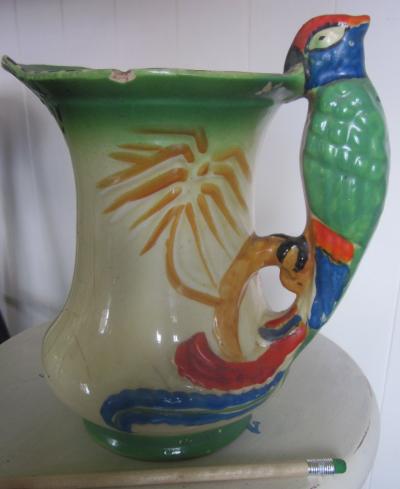National Press Club/MSCNewsWire: The Green Parrot founded 90 years ago is renowned as the most enduring and famous restaurant in the South Seas.
In a bizarre twist of events the National Press Club appears to be holding the original green parrot jug from which the Wellington institution derived its name.
The jug (pictured) was given in the early 1970s to a group of journalists in order that it might adorn the premises of a press club that was then under consideration. In the event the jug disappeared from sight. It has only just recently re-surfaced during the cataloguing of National Press Club memorabilia.
The circumstances of how the jug came into the possession of the club are noteworthy.
It was donated by Tony Poynton. He was a prominent commodities trader during the 1950s. This was sometime before the Green Parrot restaurant was taken up by society patrons such as those nowadays in the sphere of arts, entertainment and politics. In this 1950s era it was the eating place for those in hard edge sectors especially those in metals and vehicle trading. Mr Poynton was involved in both.
A commanding presence, Mr Poynton had seemingly intervened to calm down a threatened disturbance involving diners from two rival and competing camps of scrap metal exporters.Grateful for such timely and effective intervention the proprietor of that era spontaneously swept the green parrot jug off its shelf and presented it to Mr Poynton (pictured.) Of a restless and inquiring nature Mr Poynton with the advent of the 1970s took up a new profession. It was that of newspaperman. First in the advertising department of Truth and then he went on to pioneer Contact, the Wellington region mass-distribution weekly.
Of a restless and inquiring nature Mr Poynton with the advent of the 1970s took up a new profession. It was that of newspaperman. First in the advertising department of Truth and then he went on to pioneer Contact, the Wellington region mass-distribution weekly.
Rubbing shoulders now with journalists, Mr Poynton with his managerial experience and skills saw the need for a unifying organisation with its own premises. Here, he reasoned, the considerable expenditure on conviviality in those more gregarious days could be re-invested back into the vocation instead of into the brewery balance sheets.
Mr Poynton’s death was to coincide with the founding of the National Press Club and thus he was never able to follow through on this objective. At the same time, and also from cancer, there occurred the death of his close friend the broadcasting journalist David Inglis which further diminished recollections from this time.
The jug though remained. It is stamped on its base as Made in Japan. Green parrot pitchers, as they were known, were a staple of the Japanese ceramics industry during the 1920s.
The Green Parrot restaurant was begun and named by an America sailor paid off in Wellington and who went on in 1926 to found the restaurant. The conjecture is that the pitcher was acquired by the seafaring founder in Japan and went on to have pride of place in the eponymous restaurant.




